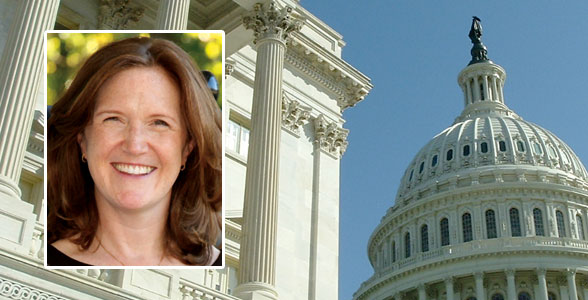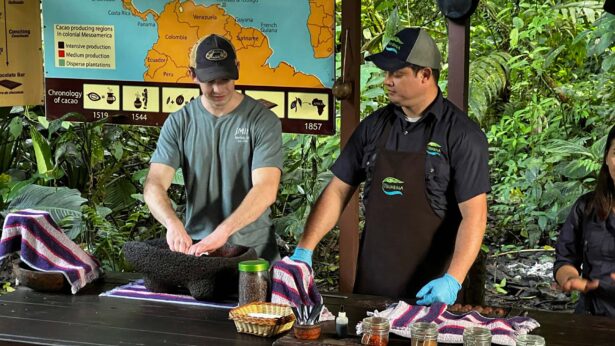By Diane Ballard
Jacquie Lawing Ebert thrives in the Washington, D.C., milieu. It’s been her niche for more than 20 years—beginning in the office of then-Senator Al Gore and later working as Gore’s issues director in the 1992 Clinton–Gore campaign, chief of staff in the U.S. Department of Housing and Urban Development, and now as a partner at the strategic communications firm GMMB.
The Memphis native and 1986 UT Knoxville honors graduate manages the Bill and Malinda Gates Foundation account for GMMB, “helping advance the foundation’s work to address the world’s inequities.”
GMMB, which she joined in 2002, focuses largely on social advocacy, gaining traction in the fight against such problems as uninsured children and high-school dropout rates. The firm also is a strategic advisor to the Democratic Party. Ebert says the 1992 campaign was one of the most exhilarating times of her career and overseeing HUD’s programs to combat homelessness was the most gratifying.
“I was part of a team at Housing and Urban Development that doubled the budget for homelessness and established the Continuum of Care that won an Innovation in Government award,” she says. The Continuum of Care concept addresses the causes of homelessness and offers community-based solutions. More than 300,000 people have been moved to permanent housing as a result.
Ebert began her career in Gore’s Senate office fresh out of UT in 1986. She intended to study law and become an attorney, but her work got in the way.
“I loved working in the legislative branch. It’s exhilarating to see good ideas become law.” When Gore was selected as Bill Clinton’s vice-presidential running mate, Ebert was swept into the campaign, as well.
Her first task at Little Rock campaign headquarters was highlighting Gore’s legislative record and areas of expertise. “For example, with Clinton having a background as a governor and Gore as a senator, there were several areas where their experience diverged. Gore was knowledgeable about arms control because of his service on Senate committees. As a governor, Clinton had different experiences. It was an intense couple of weeks.”
Throughout the campaign, Ebert oversaw Gore’s issues and events preparation briefings. “I ran a team of three people who wrote and assembled his briefing book every day. I was also involved in the war room rapid-response effort during debates.”
During the next 8 years at HUD, she says she found her passion working on homelessness, domestic policy, and social justice—experience that prepared her well for her current responsibilities with GMMB. Among the issues she promotes for the Gates Foundation are increasing U.S. rates of high-school graduation and college readiness and making technology in libraries more accessible to the public.
Tackling social problems gives Ebert a lot of satisfaction. She says growing up in Memphis in the seventies taught her about social challenges “but also the possibilities when a community is willing to embrace positive change.
“My mother inspired me to work toward social justice—to always look at life through the perspective of many. It’s very gratifying to be able to pursue a career that’s related to working on causes I believe in deeply.”
Ebert’s personal life is as active as her professional side—she and her husband, Brian, recently returned from 3 years in New York City and are the parents of 17-month-old twins. She serves on the board of Rebuilding Together, a national organization that rehabilitates homes for the elderly and disadvantaged.
At UT, she was a Torchbearer and the chair of All Campus Events. She was also active in student orientation and on the Undergraduate Academic Council. Her sister, Abigail, and brother, Thomas, also attended UT.
Ebert was an early Obama supporter, co-hosting a fundraiser for him before the presidential primaries. The U.S. may have “red states” and “blue states,” but Ebert says she always thinks of Tennessee as an orange state.



